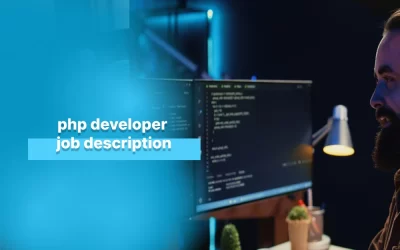What is a Scrum Master? In the realm of agile project management, the role of the Scrum Master is pivotal. Scrum Masters ensure that Scrum—a popular agile framework for managing complex projects—is understood and...
How do I become an iOS developer?
How do I become an iOS developer? The world of mobile apps is booming, and iOS apps are at the forefront of innovation and design. If you've ever dreamt of turning your ideas into reality and building the next...
What is system administration?
What is System Administration? System administration is a crucial aspect of managing and maintaining the IT infrastructure of an organization. It involves a wide range of tasks and responsibilities aimed at...
php developer job description
php developer job description In the ever-evolving landscape of web development, PHP continues to hold a prominent place. As one of the most widely used server-side scripting languages, PHP powers millions of websites...

what is full stack web development?
what is full stack web development ?
full stack web development services offer a comprehensive approach to building web applications, combining frontend and back-end expertise into a single skill set. By leveraging the versatility and problem-solving abilities of full-stack developers, businesses can create powerful, scalable, and user-friendly web applications. When choosing a full-stack web development service provider, consider their experience, expertise, customization capabilities, and commitment to quality. Embrace the power of full-stack web development and unlock endless possibilities for your online presence.
As technology evolves, the role of Full Stack Developers continues to expand. The demand for professionals who can navigate the entire development spectrum is on the rise, making Full Stack Development a compelling and rewarding career path.
In the grand tapestry of web development, Full Stack Developers emerge as the architects who design, build, and fortify the digital landscapes we traverse daily. Their magic lies not just in code but in the seamless harmony of frontend and backend, creating digital experiences that captivate and inspire.
What is full stack web development ?
Full stack languages refer to programming languages that can be used for both front-end and back-end development in a full-stack web development environment. These languages allow developers to work on both the client-side (user interface) and server-side (database, server logic) aspects of a web application. Here are some commonly used full-stack languages:
1. JavaScript: JavaScript is the most popular and widely used full-stack language. It is primarily known for its use in front-end development with frameworks like React, Angular, and Vue.js. However, with the introduction of Node.js, JavaScript can also be used on the server-side, making it a versatile full-stack language.
2. Python: Python is a high-level, general-purpose programming language known for its readability and simplicity. It is widely used in back-end development with frameworks like Django and Flask. Python can also be utilized for front-end development using frameworks like Django’s template engine or libraries like Flask or Tornado.
3. Ruby: Ruby is a dynamic, object-oriented programming language known for its elegant syntax. It is commonly used in back-end development with the Ruby on Rails framework, which provides a complete full-stack development framework.
4. PHP: PHP is a server-side scripting language designed for web development. It is primarily used for back-end development with frameworks like Laravel, Symfony, and CodeIgniter. While PHP is mainly used for server-side scripting, it can also be embedded within HTML for front-end development.
5. Java: Java is a widely adopted, general-purpose programming language known for its platform independence. It is commonly used for back-end development with frameworks like Spring and JavaServer Faces (JSF). Java can also be utilized for front-end development using frameworks like JavaFX or JavaServer Pages (JSP).
6. C#: C# (pronounced C sharp) is a versatile programming language developed by Microsoft. It is widely used for back-end development with the .NET framework, particularly with ASP.NET. C# can also be utilized for front-end development using frameworks like Windows Presentation Foundation (WPF) or Windows Forms.
These are just a few examples of full-stack languages. The choice of language depends on various factors, including the project requirements, developer familiarity, ecosystem support, and scalability needs. It’s important to note that full-stack development often involves using multiple languages and frameworks together to build robust and scalable web applications.
Read More





